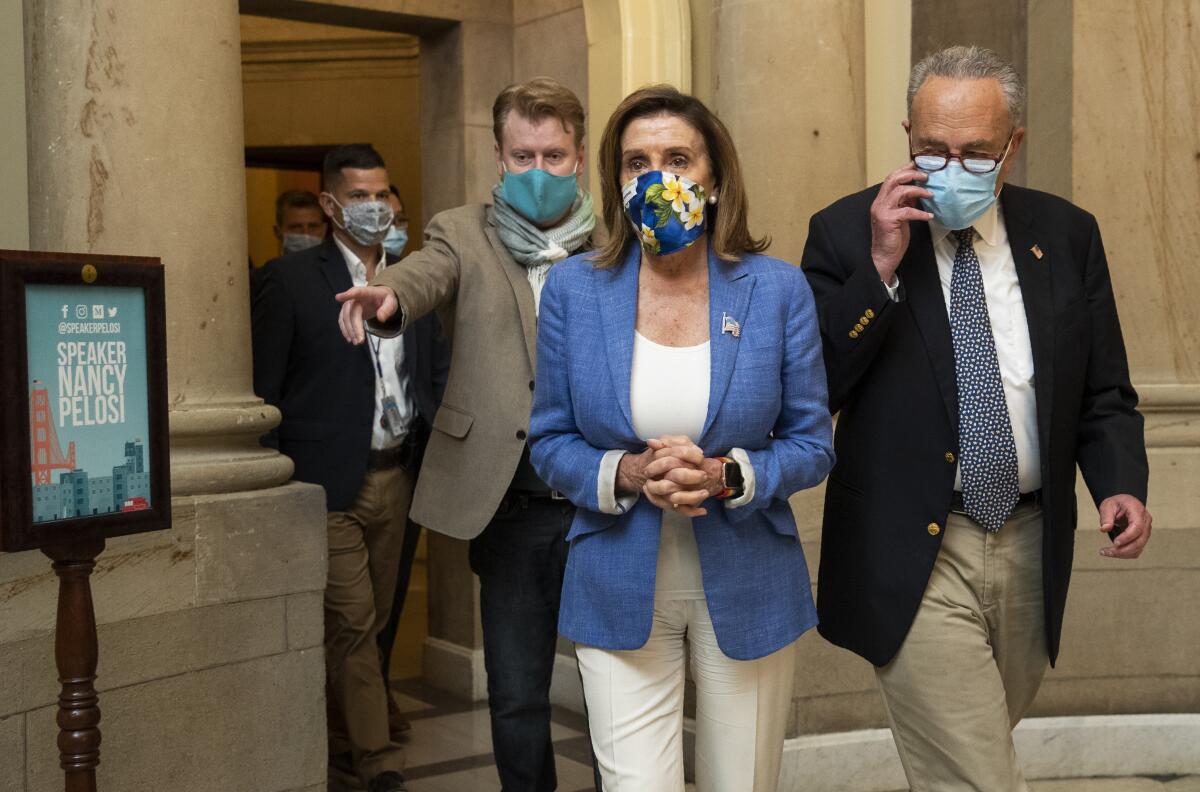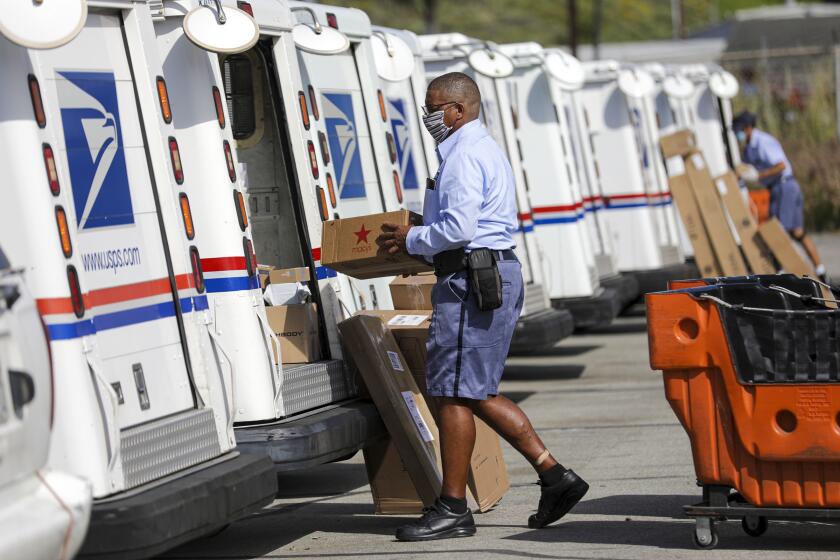Stimulus checks, jobless aid unlikely for several more weeks as Democrats, White House dig in heels

- Share via
WASHINGTON — Another round of stimulus checks for Americans and renewal of expired unemployment benefits for the millions left jobless by the coronavirus-induced recession aren’t likely to be approved until at least after Labor Day as lawmakers leave Washington for a summer break without agreement on a relief package.
And even after that, prospects for a deal look grim as each side blamed the other for the breakdown in negotiations. There haven’t been talks between congressional Democratic leaders and the White House since last week, when Trump administration officials walked away and then released four presidential orders that they said would provide enhanced unemployment, defer payroll taxes and halt evictions. The legality and effectiveness of those actions remained in doubt, however.
The Senate officially recessed Thursday until after Labor Day and the House left last week. There is little hope that leaders can hatch a deal in the coming days, but even if that happened, it would require lawmakers to return to Washington to hold votes.
And with the presidential political conventions beginning next week, leaders are unlikely to hold serious negotiations or call lawmakers back until early September.
Many in Washington are now eyeing the expiration of government funding as the next, best possibility to force action by attaching a coronavirus relief package to the must-pass spending bill. Funding for the government is set to run out Sept. 30 and neither party is likely to want to risk a government shutdown just weeks before the election.
House Speaker Nancy Pelosi (D-San Francisco) has resisted the idea of tying government funding to coronavirus relief, arguing that it is too long to wait. Enhanced unemployment benefits and other economic protections passed by Congress in March expired at the end of July.
“We can’t wait until September 30th.... People will die,” she said, noting that 77,000 have died since the Democratic-led House passed its $3.4-trillion coronavirus relief response bill in May.
The White House and Senate Republicans have countered with a $1.1-trillion plan, and rejected Democrats’ offer to compromise at around $2 trillion.
Senate Majority Leader Mitch McConnell (R-Ky.) said Thursday that he hopes a compromise would be found soon.
“I’m still hoping we’ll have some kind of bipartisan agreement here sometime in the coming weeks,” he told reporters.
Republicans accused Democrats of politicizing the stalemate to portray it as President Trump’s fault.
White House economic advisor Larry Kudlow said Democrats want to include too many items on their “liberal, left wish lists,” such as measures to provide money for mail-in voting this fall.
“So far, it’s a stalemate,” Kudlow said on CNBC. “They’re asking [for] too much money.”
But the issue became a major sticking point in the talks when Trump said he wouldn’t approve more money for the Postal Service because of Democrats’ hopes that more people vote by mail.
A Trump ally’s changes at the Postal Service spur outrage and fuel worries over mail voting in a pandemic. What is happening at the post office?
Democrats counter that the money for the U.S. Postal Service is not only vital to ensure Americans can safely vote during the pandemic, but also for delivery of prescriptions and Social Security checks.
Other major disputes include Democrats’ demands for $1 trillion in funding for state and local governments.
While Treasury Secretary Steven T. Mnuchin has had a productive working relationship with Pelosi, their dynamic earned him the distrust of some House Republicans, who generally oppose adding to the deficit for more pandemic relief to Americans.
White House Chief of Staff Mark Meadows, a former chairman of the conservative House Freedom Caucus, has been fully participating in the negotiations for the first time since the start of the coronavirus crisis. Since then, the White House has taken a firmer hand, including leaving the talks last week when they concluded Democrats weren’t willing to compromise.
McConnell has largely sat on the sidelines, content to have the White House negotiate the GOP position. Estimates are that half of Senate Republicans would oppose any deal in part because they oppose additional spending, a dynamic that has undercut his leverage and negotiating position.
For instance, Sen. Ron Johnson (R-Wis.) said his hope is that the talks remain at a stalemate, citing concern about adding to the deficit.
“From my standpoint, the breakdown in the talks is very good news,” he told Breitbart News. “It’s very good news for future generations.”
But with so many Americans struggling to pay their bills and unable to find work as COVID-19 cases continue to rise in parts of the country, the sputtering economy is worrisome to Republican senators on the ballot this fall in an election season that is already tilting toward Democrats and is likely to hinge on the response to the coronavirus.
Perhaps for that reason, there are signs that even McConnell wants the negotiators to get back in the room.
“It doesn’t make any difference who says let’s get together again, but we ought to get together again, because there hasn’t been a meeting of any consequence between the two parties since last Friday,” he said Tuesday on Fox. “That is too long.”
Mnuchin called Pelosi on Wednesday, but that conversation only resulted in dueling statements.
“We are miles apart in our values,” Pelosi said Thursday.
More to Read
Get the L.A. Times Politics newsletter
Deeply reported insights into legislation, politics and policy from Sacramento, Washington and beyond. In your inbox twice per week.
You may occasionally receive promotional content from the Los Angeles Times.











